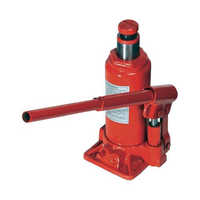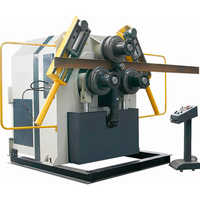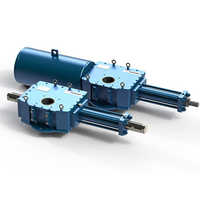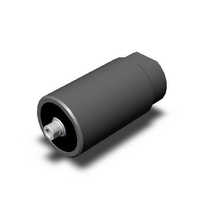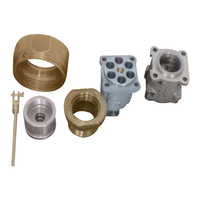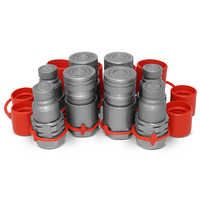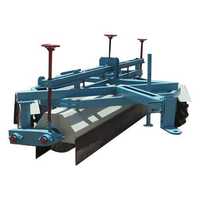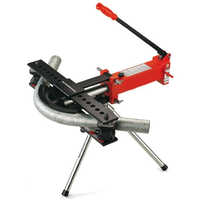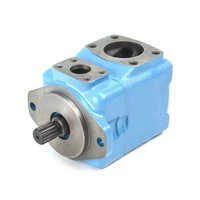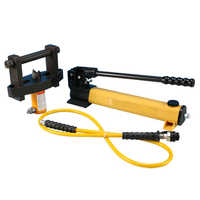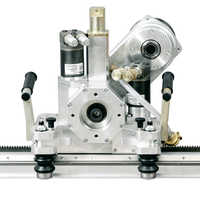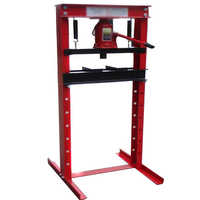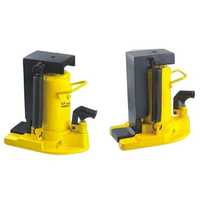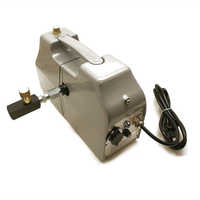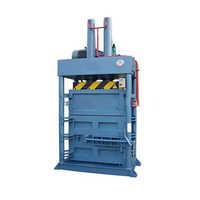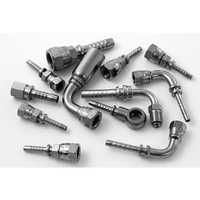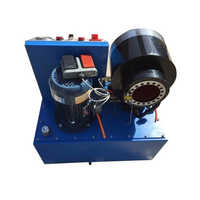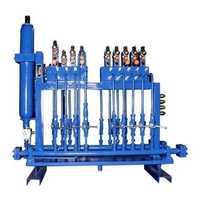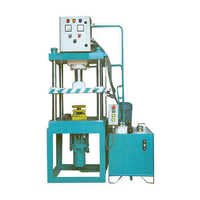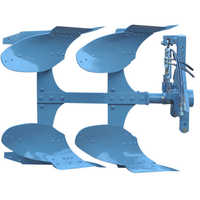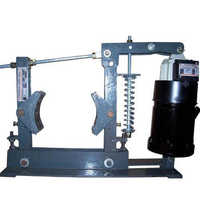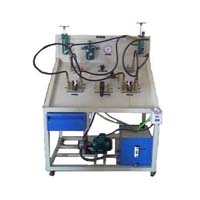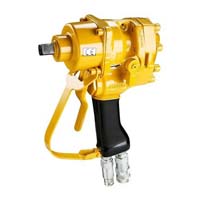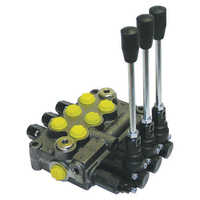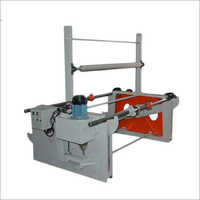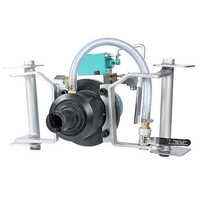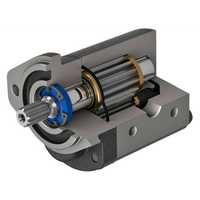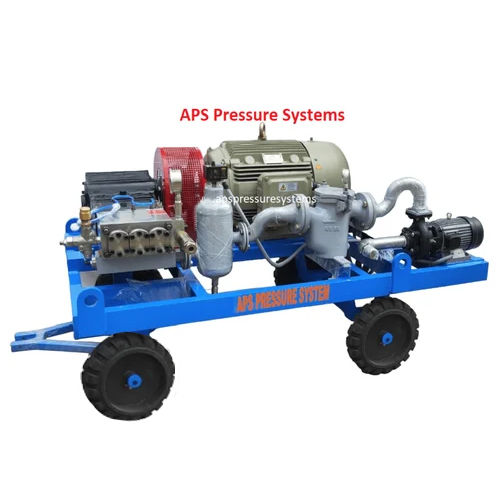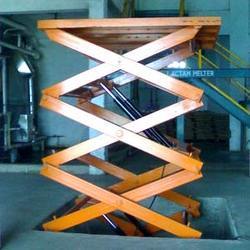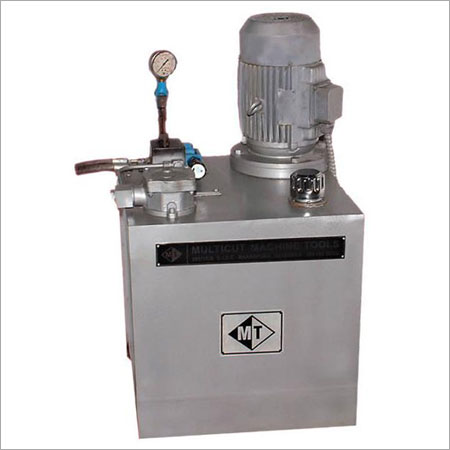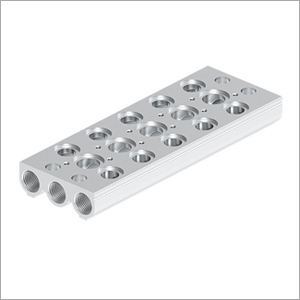Hydraulic Products & Equipment
(9238 products)
Hydraulic equipment encompasses a wide range of products, from hydraulic truck unloaders and power packs to hydraulic cylinders and filters. These products are crucial for industries such as material handling, construction, and manufacturing. Hydraulic equipment utilizes hydraulic power to generate force and motion, enabling the efficient operation of machinery and systems. It offers advantages like high power density, precise control, and the ability to transmit power over long distances. Hydraulic equipment is essential for tasks requiring controlled movement, lifting, and force generation.
...show moreThere are multiple types of Hydraulic Products & Equipment available, including hydraulic pumps, hydraulic cylinders, hydraulic valves, hydraulic hoses, and hydraulic fittings.
Hydraulic Products & Equipment are used in various industries, such as construction, manufacturing, agriculture, and transportation. They are used to power hydraulic systems, which are used to lift, move, and control heavy objects.
When choosing Hydraulic Products & Equipment, it is important to consider the specific application, the required pressure and flow rate, and the environmental conditions. It is also important to consider the compatibility of the products with your existing system.
Hydraulic Products & Equipment require regular maintenance to ensure optimal performance and safety. Maintenance tasks may include checking for leaks, replacing worn parts, and cleaning the system.
There are many resources available online and from manufacturers that provide information about Hydraulic Products & Equipment. You can also consult with a qualified hydraulics professional for assistance.
Top Hydraulic Products & Equipment Categories
Explore More Categories
Product Showcase
Made in India
Hydraulic Scissor Lift Table Warranty: 1 Year
Price Trend: 500000.00 - 1500000.00 INR (Approx.)/Piece
MOQ - 1 Piece/Pieces
Warranty - 1 Year
16 Years
Business Type: Manufacturer | Supplier
FUTURE INDUSTRIES PVT. LTD.
Made in India
Hydraulic Power Pack
12 Years
Business Type: Manufacturer | Exporter
MULTICUT MACHINE TOOLS
Manifold Block - Color: Silver
Price: 2000 INR (Approx.)/Piece
MOQ - 1000 Piece/Pieces
Weight - 300 Grams (g)
Product Type - Manifold For DCV Series
Size - 1/4"
5 Years
Response Rate: 86.67%
Business Type: Manufacturer | Exporter
UFLOW AUTOMATION
Made in India
Baling Machine Body Material: Steel
Price: 500000.00 INR (Approx.)/Unit
MOQ - 1 Unit/Units
Product Type - Baling Machine
Size - Different Available
Usage - Industrial
13 Years
Business Type: Manufacturer | Supplier
AKASH PACK TECH PVT. LTD.
Rust Proof Four Wheels Color Coated Hydraulic Scissor Lifting Table Trolleys Capacity: 200 Kg/Hr Kg/Hr
Color - Orange and Black
Product Type - Hydraulic Scissor Lifting Table Trolleys
1 Years
Business Type: Manufacturer | Exporter
VEDANT LIFT
Durable and Rust Proof 34 Kg Electro Hydraulic Thruster
Price: 7000 INR (Approx.)/Piece
MOQ - 5 Piece/Pieces
Usage - EOT Cranes , Hoist , Winches
Weight - 21 Kilograms (kg)
Color - Black
12 Years
Business Type: Manufacturer | Distributor
GUNATIT ELECTROPOWER PRIVATE LIMITED
Heavy Duty Hydraulic Cold Forming Tee Machine
11 Years
Business Type: Manufacturer | Supplier
GUO ZHONG INTERNATIONAL LIMITED
50Hz Electric Torque Wrench Body Material: Stainless Steel
Price: 385000 INR (Approx.)/Piece
MOQ - 1 Piece/Pieces
Color - Gray & Black
Weight - 35-40 Kilograms (kg)
Usage - Industrial
8 Years
Business Type: Manufacturer | Exporter
ASMI ENGINEERING
Laser PIV System
Price Trend: 50000.00 - 500000.00 INR (Approx.)/Pack
MOQ - 1 Pack/Packs
10 Years
Business Type: Manufacturer | Distributor
DIDAC INTERNATIONAL
Verified Exporter
( Accepts only Foreign Inquiry)
Made in India
Gamut Hydraulic Lathe Tracer
14 Years
Business Type: Manufacturer | Distributor
GAMUT MACHINE TOOLS
Gray Jmdg16 Radial Piston Hydraulic Motors
Price: 62000 INR (Approx.)/Piece
MOQ - 10 Piece/Pieces
Color - Gray
Product Type - Radial Piston Hydraulic Motors
Usage - Industrial
12 Years
Business Type: Manufacturer | Distributor
JACKTECH HYDRAULICS
Made in India
Hydraulic Honed Tubes
Price Trend: 50000.00 - 100000.00 INR (Approx.)/Unit
MOQ - 1 Unit/Units
8 Years
Business Type: Manufacturer | Supplier
PRECIHOLE MACHINE TOOLS PVT. LTD.
Made in India
Qc Coupling Body Material: Stainless Steel
Price: 350.00 INR (Approx.)/Piece
MOQ - 10 Piece/Pieces
Color - Silver
Product Type - Coupling
Body Material - Stainless Steel
20 Years
Response Rate: 86.00%
Business Type: Manufacturer | Distributor
BRILLIANT ENGINEERING WORKS
Yellow High Raised Hydraulic Scissor Lift
Price: 350000 INR (Approx.)/Unit
MOQ - 1 Unit/Units
Usage - Industrial
Color - Yellow
Product Type - High Raised Hydraulic Scissor Lift
9 Years
Business Type: Manufacturer | Distributor
SIDDH KRUPA STEEL FAB
Hydraulic Machine - Body Material: Steel
Price: 100000 INR (Approx.)/Unit
MOQ - 1 Unit/Units
Usage - Industrial Use
Size - Customized
Product Type - Semi Automatic Industrial Hydraulic Machine
13 Years
Business Type: Manufacturer | Exporter
S. S. ENGINEERING WORKS
Made in India
Power Operated Hydraulic Press
6 Years
Business Type: Manufacturer | Distributor
HARDIC Engineering
Made in India
Jumbo Industrial Power Pack
Price Trend: 100000.00 - 150000.00 INR (Approx.)/Unit
MOQ - 1 Unit/Units
6 Years
Business Type: Manufacturer | Exporter
JINDAL HYDRO PROJECTS INC.
Made in India
Yellow White Hydraulic Forming Press For Roof Lining
Price: 700000 INR (Approx.)/Unit
MOQ - 1 Unit/Units
Usage - Industrial
Product Type - Hydraulic Forming Press
Color - Yellow White
22 Years
Business Type: Manufacturer | Supplier
SANTEC EXIM PRIVATE LTD
Made in India
Baling Press Machine Body Material: Steel
Price: 500000 INR (Approx.)/Unit
MOQ - 1 Unit/Units
Product Type - Baling Press Machine
Usage - Industrial
Color - Blue-Orange
2 Years
Business Type: Manufacturer | Exporter
PRAGYA PRECISION EQUIPMENT PRIVATE LIMITED
Made in India
Conveyor Type Chapati Rolling Machine For Industrial Capacity 300 Pcshrs, Machine Size(ft.): 4x3x2 ft
6 Years
Business Type: Manufacturer | Trading Company
JACKSON MACHINE
Easy Installation Hydraulic Zero Scissor Lift Table (Load Capacity 1-2 Ton)
Price: 300000 INR (Approx.)/Unit
MOQ - 1 Unit/Units
Height - 10 feet Foot (ft)
Usage - Material Handling use
Color - yellow,red,blue black
2 Years
Business Type: Manufacturer
BESTO MATERIAL HANDLING EQUIPMENTS
Made in India
Verified Quality Hydraulic Ironworker
MOQ - 11 unit
5 Years
Business Type: Manufacturer
RUDRAKSH ENGINEERING
Made in India
Ferrule Crimping Machine
14 Years
Business Type: Manufacturer | Distributor
ANISH HYDRAULICS PVT. LTD.
Made in India
Hydraulic Iron Worker
3 Years
Business Type: Manufacturer | Exporter
WELDOR ENGINEERING PVT. LTD.
Made in India
Hydraulic Deep Drawing Press Machine
10 Years
Business Type: Manufacturer | Exporter
VIVEK MACHINE TOOLS
Made in India
Hydraulic Iron Worker
4 Years
Business Type: Manufacturer | Exporter
BERLIN MACHINERIES PRIVATE LIMITED
Floor Mounted Round Shape Heavy-Duty Hydraulic Rotary Platforms For Industrial
Product Type - Rotary Platforms
Size - Customized
Usage - for Industrial
7 Years
Business Type: Manufacturer | Supplier
M.B. Engineering Inds.
Made in India
Heavy Duty Industrial Hydraulic Rock Breaker
Usage - Rock breaker
Product Type - Hydraulic rock hammer
Weight - 950 Kilograms (kg)
10 Years
Business Type: Manufacturer | Exporter
EMTEX MACHINERY PRIVATE LIMITED
Hydraulic Products & Equipment Manufacturers | Suppliers in India
| Company Name | Location | Member Since |
|---|---|---|
| Santec Exim Private Ltd | Gurugram, India | 22 Years |
| Brilliant Engineering Works | Mumbai, India | 20 Years |
| Future Industries Pvt. Ltd. | Ahmedabad, India | 16 Years |
| Gamut Machine Tools | Dombivli, India | 14 Years |
| Anish Hydraulics Pvt. Ltd. | Pune, India | 14 Years |
| Akash Pack Tech Pvt. Ltd. | Faridabad, India | 13 Years |
| S. S. Engineering Works | Coimbatore, India | 13 Years |
| Multicut Machine Tools | Vadodara, India | 12 Years |
| Gunatit Electropower Private Limited | Rajkot, India | 12 Years |
| Jacktech Hydraulics | Ahmedabad, India | 12 Years |
Hydraulic Products & Equipment
A wide variety of machining tasks may be accomplished by hydraulic machinery because of the pressurized fluid that it employs. An engine or motor is often used to operate the pump in hydraulic equipment, which then pressurizes the hydraulic fluid. After that, the fluid is routed via hydraulic tubes and delivered to the machine's actuators. These actuators make use of the pressure generated by the fluid in order to accomplish the duty that has been given to them. After going through the filter, the fluid is recirculated to the pump to undergo a second round of pressurization. Mineral oil organophosphate or polyalphaolefin ester is the typical composition of hydraulic fluid; however, a wide variety of other chemicals may also be utilized.
Hydraulic Products & Equipment Functions
Many different kinds of machinery in many different kinds of businesses are driven by hydraulic power. Because of its adaptability as well as the great levels of power that may be accomplished with very uncomplicated techniques, its use is really popular. Hydraulic power is often used by the majority of heavy construction equipment. The hydraulic pumps that pressurize hydraulic fluid are powered by gas engines, which are used in all types of cranes, lifts, bulldozers, and diggers. Following that, the power that was saved is used to move the lifting mechanisms, machine blades, and arms. Hydraulic power is another essential component found in the vast majority of manufacturing facilities. Hydraulic power is often either directly or indirectly accountable for the movement of the majority of automated components. Hydraulics are often used in the operation of clutches, industrial hammers, punches, pullers, and brakes. Presses, lathes, and robotic arms all include hydraulics in their designs.
For hydraulic equipment to function properly, a wide variety of valves, pumps, filters, and actuators are required. Hydraulic cylinders transform fluid pressure into mechanical force, usually by pushing a piston, while check valves prevent liquid from flowing backward or leaking out of the system. Within a hydraulic system, the tubes and seals also have a significant amount of significance. They must be able to sustain tremendous pressures while often maintaining some degree of elasticity. For hydraulic applications, a wide variety of specialized fluid circulation systems and seals are developed.
Importance of Hydraulic Products & Equipment
One of the fundamental components that contribute to the development of many industries is hydraulic. Hydraulics may be of substantial assistance, whether they are added to your heavy-duty vehicles or used to power your machines. The knowledgeable staff at the hydraulic firm utilizes the hydraulic system for a variety of applications in the industrial sector. An experienced hydraulics manufacturer provides a number of options to their customers so that they may fulfill their needs in a variety of ways. Hydraulics is the workhorse of the heavy industry. It employs fundamental principles of physics to carry out all of the tasks necessary to ensure that the lift continues to function appropriately in large-scale building projects. The functionality of mechanical devices that are dependent on hydraulic components is improved. The use of hydraulic systems in the manufacturing business comes with a number of benefits, the most important of which are as follows:
- During design changes and efforts to maximize production capacity, the flexibility, and utility of a hydraulic system are crucial assets to have.
- When compared to pneumatic systems, hydraulic systems are more efficient since they generate less heat and use less energy than pneumatic systems.
- Because it can be modified with a little amount of effort on the part of the mechanism, a hydraulic system makes it possible to integrate brand-new items into already-established production lines in an effortless manner.
- A hydraulic system enables more control over the settings of the machine, which in turn reduces the amount of time that is lost and the number of mistakes that occur throughout the manufacturing process.
How To Find Hydraulic Equipment
Hydraulic equipment can be found in multiple hardware stores both online and offline. You could even hop on to amazon, IndiaMART, TradeIndia, etc., and buy it right now.
Most Common Hydraulic Products & Equipment
Hydraulic systems are made up of a variety of components, some of which include the valves, the fluid, the electric motor, the hydraulic pump, the reservoir, and the hydraulic cylinder. In order to accommodate the wide variety of uses for hydraulic systems, the designs of these components often undergo several iterations.
- Actuator: The hydraulic fluid's potential energy is converted into usable mechanical energy by the actuator. Rotary or linear motion may be produced by an actuator. Actuators are available in a wide variety of designs, the most common of which is the piston type.
- Hydraulic fluids: Within hydraulic systems, the hydraulic fluid functions as the channel for the transmission of energy. There is a very wide variety of hydraulic fluids available for use in a variety of settings. Many different kinds of applications make use of hydraulic fluids that are based on oil because of their qualities that it has. Oil-based fluids have the potential to be engineered to provide the anti-corrosion, anti-wear, and viscosity qualities that are needed, all while presenting only minimum challenges in terms of safety, operation, and maintenance. However, there are several circumstances in which oil-based fluids are not the appropriate choice. For the same reason, oil-based fluids are prohibited from use in fire and rescue operations because they pose a risk of ignition. Therefore, these processes may employ hydraulic fluids that are fire-resistant, such as polyol and phosphate esters, water-glycol, and invert emulsion, in place of oil-based fluids.
- Reservoir: The hydraulic fluid is stored in the reservoir, which is situated in a place that is easily accessible by the pump intake. In addition to this, it removes heat from the system, helps remove excess air and moisture from the fluid, and makes it possible for solid impurities to settle out.
- Valves: Both the flow and the pressure in the system are controlled by the valves. They regulate the flow of fluid both between the reservoir and the pump, as well as between the pump and the actuator, as well as inside the actuator itself.
- Hydraulic Pump: Hydraulic energy is produced when mechanical energy and motion are converted into hydraulic energy by the hydraulic pump. The hydraulic pump transports hydraulic liquid via the hydraulic tool. The energy needed to run the pump may come from a variety of sources, including air pressure, an internal combustion engine, an electric motor, or a power take-off. There are many distinct types of pumps, such as pistons, vane, and gear pumps. But they all function according to the same concept, which involves pushing fluid volume against a load or pressure that is acting as resistance.
Conclusion
The capacity of hydraulic machines to transmit a significant amount of power via pliable hoses and narrow tubes accounts for the widespread use of these devices. Hydraulic systems are superior to mechanical, pneumatic, and electrical systems in terms of their capacity to carry higher weights and produce more force. They maintain a consistent torque and force no matter the speed of the system, which is not achievable with other types of mechanisms.
FAQs: Hydraulic Products & Equipment
Q. What is hydraulic equipment usage?
Ans. Hydraulics are used in lifting and lowering mechanisms found in several types of machinery, including cranes, forklifts, jacks, pumps, and fall arrest safety harnesses. Airplanes. To operate their control panels, they make use of hydraulic machinery.
Q. What are hydraulic products and their types?
Ans. Both closed-loop and open-loop hydraulic systems are considered to be kinds of hydraulic systems. In a system with an open loop, there will be fluid flow but there will be no pressure when the actuating mechanism is not in use. When the pump is in operation inside a system with a closed loop, there will be pressure for the fluids.
Q. Why is hydraulic equipment important?
Ans. Here are some reasons why hydraulic equipment is important:
- Starting, stopping, accelerating, and decelerating may all be accomplished with relative ease because of the presence of a few straightforward levers and pushbuttons.
- Accurate: The controls improve the ease of operation of the equipment, which in turn decreases the likelihood of errors caused by human operators.
- handles a wide variety of weights: Fluid-based hydraulic systems are devoid of levers, pulleys, and gears. This indicates that it can readily tolerate varying amounts of weight.
- Consistent force and torque are provided by the pressurized fluid system, and variations in speed have no influence on these properties.
- Because there are fewer moving components, the hydraulic system is simplified, making it safer and simpler to maintain. In comparison to electrical and mechanical systems, this also contributes to their cost-effectiveness.
- Because it does not ignite, hydraulic systems are suitable for use in hazardous environments such as mines and chemical factories
Q. How is hydraulic equipment used?
Ans. The operation of a great number of components in heavy equipment is governed by hydraulic systems. They make it possible for lifted arms to move higher, buckets to collect soil and other materials, and booms to swing back and forth. They also play an important part in the functioning of the drive system, which is what makes it possible for the engine to operate effectively.
Related Categories
Abrasives
Acoustic Products
Acrylic Sheets
Air Blowers
Air Compressors & Air Separation Plants
Air Cooler
Air Dryers
Air Receiver
Air Valves
Aluminum Castings
Anchors
Anti Vibration Mounts
Ball & Roller Bearings
Ball Valves
Ballast Making Machines
Bearing Parts & Components
Bearings
Bellows & Expansion Joints
Belt Pulleys
Boilers, Components & Spares
Bolts
Bright Bars
Bristles
Burners/Industrial Burners & Incinerators
Bushings & Bushing Parts
Butterfly Valves
CNC Machined Components
Cable Pulleys
Capital Goods
Carbon & Graphite Products
Castor Wheels
Centrifugal Pumps
Centrifuges
Ceramics
Chains & Chain Link Fence Fittings
Cleaning Equipment
Clips, Clamps
Coils
Combustion Equipment
Compression Springs
Compressors & Allied Equipment
Control Valves
Conveyor & Conveyor/Industrial Belts
Cooling Tower & Chilling Plants
Corrosion Protection Materials
Coupling
Cranes
Cryogenic Equipment
Cutting Tools, Broaches & Cutters
Departmental Shelving
Diaphragm Valves
Die Castings
Dies & Moulds
Dies,Jigs,Fixtures
Diesel Engine & Electric Locomotive Spares
Draught Fan
EOT Cranes
Electric Hoists
Electric Motors & Engines
Electroplating Chemicals & Equipment
Elevators, Lifts & Escalators
Energy Management System
Engine Valves
Engineering Goods & Equipment
Engineering Plastics
Engraving Equipment
Extruded Profiles
Fasteners
Fiberglass Products
Filter Cartridges & Media
Filter Cloth, Filter Industrial
Filters-Air, Gas, Liquid
Filtration & Sedimentation Units
Flat Metal Processing Equipment
Float Valves
Fork Lift Truck Parts
Fork Lift Trucks
Forklifts
Foundry Raw Material & Equipment
Furnace Manufacturers
Galvanized Fasteners
Gantry Cranes
Gaskets
Gate Valves
Gauges & Gauge Glasses
Gear Boxes, Reduction Gears & Gear Cutting
Girder Cranes
Glass & Glass Products
Glass Cutting Tools/Glass Cutters
Globe Valves
Goliath Cranes
Grating
Hand & Allied Tools
Hand Pump
Hardware & Tools
Heat Exchangers
Heating Elements
Hex Bolts
Hex Nuts
Hooks & Mounts
Hoses
Hot Air Oven
Humidification & Ventilation Equipment
Hydraulic Hoses & Flexible Metal
Hydraulic Press
Hydraulic Press Brakes
Hydraulic Products & Equipment
Hydraulic Valves
Induction Heating Equipment
Industrial Automation
Industrial Brakes
Industrial Brushes
Industrial Clothing
Industrial Clutches
Industrial Cylinders
Industrial Dryers
Industrial Evaporators
Industrial Knives
Industrial Nets
Industrial Ovens
Industrial Rollers
Industrial Supplies Stocks
Industrial Supplies-General
Industrial Tape
Industrial Tools
Industrial Valves
Industrial Vibrator
Inspection Equipment
Instrumentation
Internal Combustion Engine
Jib Cranes
Laboratory Furniture
Laboratory Glassware & Equipment
Laundry Equipment
Lined Valves
Machine Tools Accessories
Marking Systems
Material Handling Equipment
Measuring Tools & Equipment
Mechanical Seals
Metallised Capacitor Films
Mining Equipment
Mining, Exploration & Drilling Machinery
Model Making Materials
Motor Couplings
Moulded Components
Moulds
Needle Valves
Needles
Nuts
Oil Seals
Outdoor Cooling Systems
Overhead Cranes
PVC Hoses
PVC Products
Paint Brushes
Painting Equipments & Maintenance
Perforated Sheets
Plastic Processing Machinery Parts
Plastic Valves
Plastic Welding Equipment
Plate Valves
Plug Valves
Pneumatic Products & Tools
Pneumatic Valves
Polish & Polishing Material/Machinery
Power Press
Precision Brass Components
Pressed Components
Pressure Gauges
Pressure Vessels
Pulleys
Pulverizers
Pump Spares Parts
Pumps & Pumping Equipment
Radiators
Refrigeration & Equipment
Rope Pulleys
Rope,Twines & Webbings
Ropes
Rotary Valves
Rubber & Rubber Products
Rubber Gaskets
Rubber Roller
Rubber Seals
Rubber Transmission Belts
Screws
Seals
Sensors & Transducers
Shaft Couplings
Shafts & Shaft Collars
Sheet Metal Components & Parts
Solenoid Valves
Springs
Stainless Steel Bolts
Stainless Steel Fasteners
Stainless Steel Nuts
Stainless Steel Valves
Storage Systems
Storage Tanks
Submersible Pumps
Surface Finishing Equipment
Synthetic Industrial Diamonds
Testing & Measuring Equipment
Thermostatic Bimetals & Thermostats
Trolleys & Carts
Tungsten Carbide
Ultrasonic Equipment
V-Belts
Vacuum Equipment & System
Valves
Valves Fittings
Vibrating Screen
Washers
Water Coolers
Weighbridge
Welding & Soldering Supplies
Welding Electrodes
Welding Equipment
Winches
Wire Drawing Dies
Wire Rope Hoists
Wire Ropes
